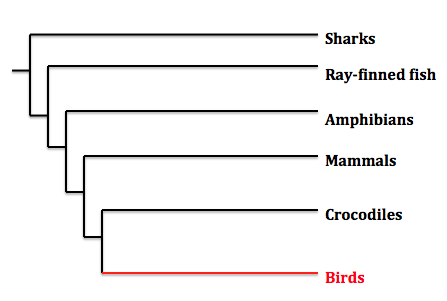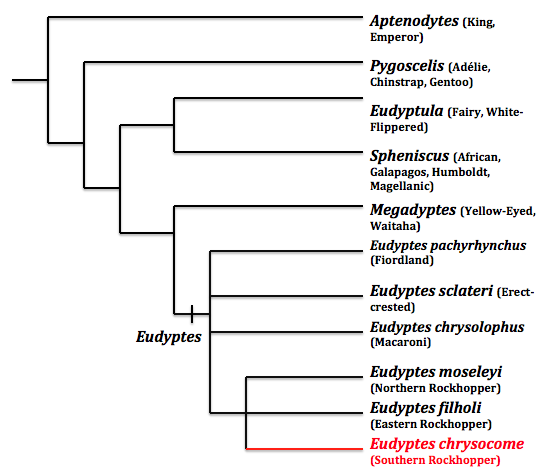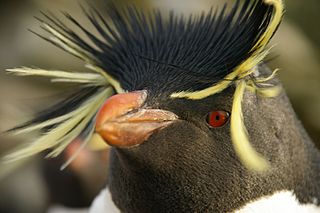Classification
Domain: Eukarya
Membrane bound organelles including a nucleus that have specific
functions.
Kingdom: Animalia
Multicellular eukaryote, mobile at some point in development,
heterotrophic (eat other things), lack cell walls but possess skeletal
support, reproduce sexually.
Phylum: Chordata
Notochord, dorsal hollow nerve cord, pharyngeal slits, postanal tail at
some point in development (Carter 2014).
Class: Aves
Beak (no teeth), feathers, large-yolked and hard-shelled eggs,
endothermic (warm-blooded), bipedal, forelimbs developed into wings
(Animal Diversity Web 2001).

Figure 1. Phylogeny showing where birds (class: aves) are found within the vertebrates. Birds are a sister clade of crocodiles (Hudak 2012). Eudyptes chrysocome exists within the birds. They are a very modern bird from an evolutionary standpoint. M. Gruber 2014.
Order: Sphenisciformes
Found in southern hemisphere, flightless, modified wings, marine birds,
short legs toward back of body (Animal Diversity Web 2001).
Family: Spheniscidae
18 species of birds in this family, height range: 1.5-3.7 feet; body is
black or dark grey, crested white chests, stiff wings that act like
flippers, webbed feet (Wildlife Journal Junior 2014).
Genus: Eudyptes
Genus comprised of five species, lay two eggs, raise one chick,
yellow-orange feather plumes, red bills, migratory, offshore foragers
(Penguin World).
Species: Eudyptes chrysocome
Two subspecies- chrysocome and filholi due to geography, smaller in size
than other Eudyptes species, thin gold short plumage, red eyes (Penguin
World).

Figure 2. This phylogenetic tree shows the genus names of other penguins as well as the species names for the genus Eudyptes. Eudyptes chrysocome shares its genus name with two other penguin organisms that have also been classified into subspecies by region (Brown 2008). Emperor penguins are members of the genus Aptenodytes which are Eudyptes most distant relative of all penguin species. M. Gruber 2014.
Penguin World has a section on its Rockhopper penguin page titled "Identification" that does a great job explaining how Rockhopper penguins are distinguished from other crested penguins.
Etymology
The Greek meaning of the scientific name of Rockhopper penguins is reflective of their physical description and behaviors. “Eudyptes” means “good diver” and “chrysocome” means “golden haired” (Australian Antarctic Division 2005).
Home References Contact Us Continue To Habitat & Geography

